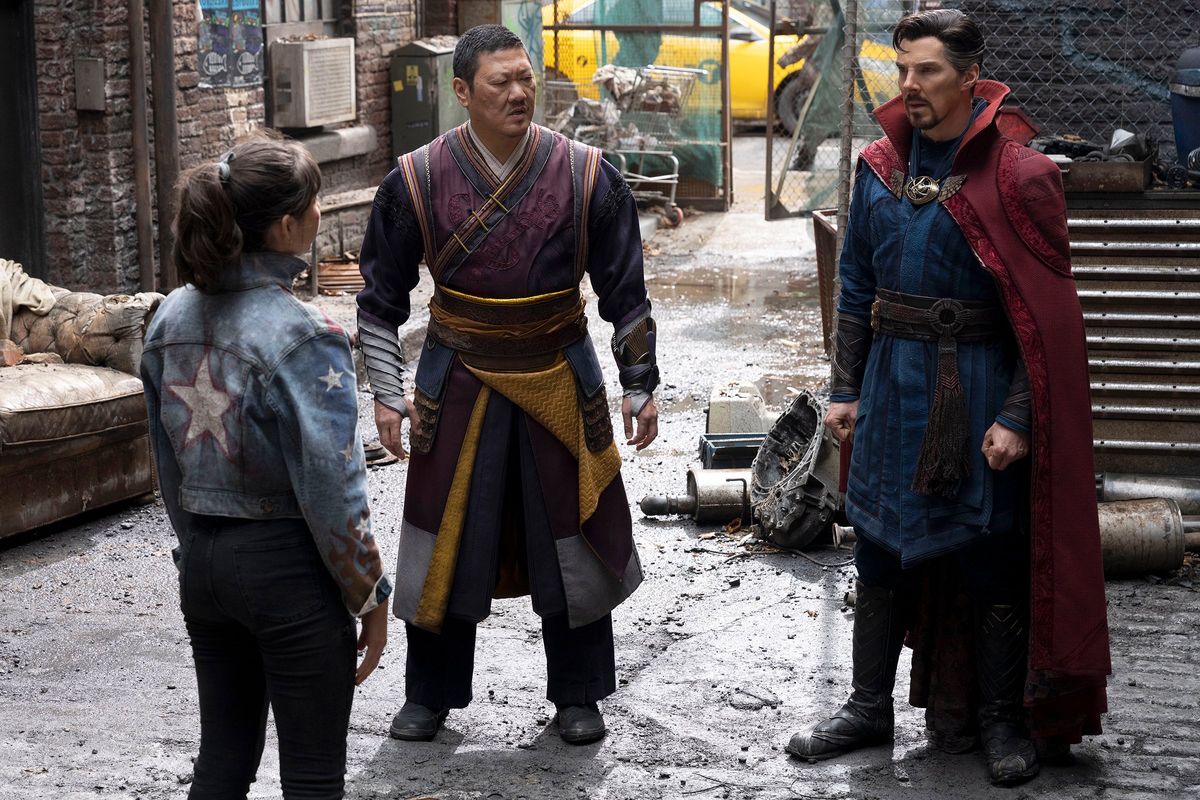Review: ‘Doctor Strange’ sequel is lost in the multiverse

A lot of movies have a backstory. “Doctor Strange in the Multiverse of Madness” comes with a syllabus. Have you seen the 2016 film, to which this is a sequel? Good, you’ll need it. (Perhaps consider a refresher. Six years is a long time.) You don’t need to watch – or rewatch – all the Avengers movies, of which only the last two feature the titular superhero/sorcerer/doctor (Benedict Cumberbatch).
But it might be helpful to refamiliarize yourself with the events of 2018’s “Infinity War,” which sets up a critical dynamic involving the new film’s other main character, Wanda Maximoff, aka Scarlet Witch (Elizabeth Olsen). Finally, it is really, really helpful, maybe even vital, to have seen the streaming TV series “WandaVision,” set in the suburban town of Westview, without which you may be a little confused.
“I’m not here to talk about Westview,” says Cumberbatch’s Stephen Strange to Wanda, early in “Multiverse.” And then they proceed to talk about Westview – or at least to engage in a cosmic struggle that is entirely premised on what happened at Westview – for the next two hours. In what kind of universe are we expected to do that much homework before going to the movies?
The answer, of course, is in the cross-platform entertainment complex known as the Marvel Cinematic Universe, in which it is no longer enough to have simply watched all the movies. Now you have to watch all the TV shows, too. (Disney+: Available for eight bucks a month.) The new film concerns what we’ll call a difference of opinion between former comrades in arms Stephen and Wanda, centering on a new character, America Chavez (Xochitl Gomez).
She is a teenager who possesses the ability to travel between alternate realities. There’s something Wanda wants in one of those parallel worlds – the family she lost in “WandaVision” – and she’ll stop at nothing to get it, even if harnessing America’s power to do so means killing the girl. (“I’m not a monster, Stephen,” she says. “I’m a mother.” That’s a great line, courtesy of screenwriter Michael Waldron.)
This sets off a metaphysical chase across the multiverse that is at times difficult to follow and at other times absolutely, mind-blowingly beautiful. There’s a trippy, effects-laden sequence in which Stephen and America tumble through several variants of the multiverse – including one in which both characters are made entirely of paint – before crash landing in an alternate version of Stephen’s hometown, New York City.
The gazillion CGI wizards who worked on that one should get a raise. Their names are listed in the small-type credits, after the first stinger scene and before the second one. Stay in your seat for both. The story involves a form of astral projection, from one universe to another, called dream walking – because dreams, as it turns out, are portals to access our “multiversal selves,” as Stephen puts it.
At another point, Stephen asks, rhetorically, “You ever have that dream where you’re falling, as if you’ve been pushed off a tall building?” That’s what watching “Multiverse” feels like a lot of the time: totally disorienting, kind of cool and also a bit terrifying. Directed by Sam Raimi (“The Evil Dead”), the new movie is especially violent and grisly for Marvel, with a spiked-fence impalement and a zombie version of Stephen – one of four variants of the title character from various multiverses. (And you thought three Spider-Mans was a lot.)
There’s stuff to like in “Multiverse”: amazing effects, surprise cameos, even the unexpectedly moving scene in which Wanda realizes that she has, at last, become a monster. But there’s also stuff that’s just, for lack of a better word, annoying. Much of this has to do with the film’s obsessive focus on delivering for its hardest-core fan base. And that focus is fine, but why does it have to be at the expense of the more casual viewer? More and more, Marvel’s attitude toward any audience member who fails to meet the studio’s criteria for devotion is starting to feel dismissive, and it leaves people out of the party.
For a lot of “Multiverse,” you might feel as if you, like Stephen, are having a bad dream: as if you’re running after something you just don’t have enough information to fully understand. On one level, that’s appropriate for the film’s themes and narrative. But expecting filmgoers’ appreciation of character motivation to be based on prerequisite media that they haven’t consumed fully – or dutifully – enough doesn’t just feel bad. It feels unfair.